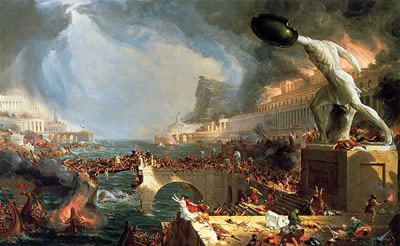I came across this list of reasons historians have suggested over the past couple hundred years for the fall of Rome in The Fall of Rome: And the End of Civilization by Bryan Ward-Perkins.
It was compiled by German historian Alexander Demandt for his 1984 history Der Fall Roms, but since I have neither 350 spare dollars to purchase a copy of my own nor the German to read it, I turned to Google to slake my thirst. It led me to Crooked Timber and now, without further ado, here are 210 reasons Rome fell.
Abolition of gods, abolition of rights, absence of character, absolutism, agrarian question, agrarian slavery, anarchy, anti-Germanism, apathy, aristocracy, asceticism, attacks by Germans, attacks by Huns, attacks by nomads on horseback.Backwardness in science, bankruptcy, barbarization, bastardization, blockage of land by large landholders, blood poisoning, bolshevization, bread and circuses, bureaucracy, Byzantinism.
Capitalism, change of capitals, caste system, celibacy, centralization, childlessness, Christianity, citizenship (granting of), civil war, climatic deterioration, communism, complacency, concatenation of misfortunes, conservatism, corruption, cosmopolitanism, crisis of legitimacy, culinary excess, cultural neurosis.
Decentralization, decline of Nordic character, decline of the cities, decline of the Italic population, deforestation, degeneration, degeneration of intellect, demoralization, depletion of mineral resources, despotism, destruction of environment, destruction of peasantry, destruction of political process, destruction of Roman influence, devastation, differences in wealth, disarmament, disillusion with state, division of empire, division of labour.
Earthquakes, egoism, egoism of the state, emancipation of slaves, enervation, epidemics, equal rights (granting of), eradication of the best, escapism, ethnic dissolution, excessive aging of population, excessive civilization, excessive culture, excessive foreign infiltration, excessive freedom, excessive urbanization, expansion, exploitation.
Fear of life, female emancipation, feudalization, fiscalism, gladiatorial system, gluttony, gout, hedonism, Hellenization, heresy, homosexuality, hothouse culture, hubris, hyperthermia.
Immoderate greatness, imperialism, impotence, impoverishment, imprudent policy toward buffer states, inadequate educational system, indifference, individualism, indoctrination, inertia, inflation, intellectualism, integration (weakness of), irrationality, Jewish influence.
Lack of leadership, lack of male dignity, lack of military recruits, lack of orderly imperial succession, lack of qualified workers, lack of rainfall, lack of religiousness, lack of seriousness, large landed properties, lead-poisoning, lethargy, levelling (cultural), levelling (social), loss of army discipline, loss of authority, loss of energy, loss of instincts, loss of population, luxury.
Malaria, marriages of convenience, mercenary system, mercury damage, militarism, monetary economy, monetary greed, money (shortage of), moral decline, moral idealism, moral materialism, mystery religions, nationalism of Rome’s subjects, negative selection.
Orientalization, outflow of gold, over-refinement, pacifism, paralysis of will, paralysation, parasitism, particularism, pauperism, plagues, pleasure-seeking, plutocracy, polytheism, population pressure, precociousness, professional army, proletarization, prosperity, prostitution, psychoses, public baths.
Racial degeneration, racial discrimination, racial suicide, rationalism, refusal of military service, religious struggles and schisms, rentier mentality, resignation, restriction to profession, restriction to the land, rhetoric, rise of uneducated masses, romantic attitudes to peace, ruin of middle class, rule of the world.
Semi-education, sensuality, servility, sexuality, shamelessness, shifting of trade routes, slavery, Slavic attacks, socialism (of the state), social tensions, soil erosion, soil exhaustion, spiritual barbarism, stagnation, stoicism, stress, structural weakness, superstition.
Taxation, pressure of terrorism, tiredness of life, totalitarianism, treason, tristesse, two-front war, underdevelopment, useless diet, usurpation of all powers by the state, vaingloriousness, villa economy, vulgarization.
Any of those look familiar? I’m pretty sure I’ve seen them all used at various times by various people to bemoan the degenerate condition of the US. Hell, I’ve used a fair few of them myself.
Except for maybe tristesse. That’s a new one. Oh, and hyperthermia.

You must be crazy. Tristesse is the most obvious reason for the degenerate condition of the US.
Also, I suck at closing italics.
Emancipation of the slaves, though? Haven’t heart that one.
That might refer to the increasing power freedmen had in the imperial bureaucracy, or it might be a reference to how it became illegal to enslave people for non-payment of debt in the later empire.
I can see someone arguing that freedmen brought down the state, or making some heinous argument about damage to the economy from unpaid debts.
In the 5th c. when the Goths and Vandals were invading hard, slaves were allowed to join the army, paid with a small fee and their freedom, but I don’t think whoever it was who blamed the fall of Rome on emancipation could be talking about that, because by then Rome was in full-on fall mode.
heart=heard
Freudian slip?
You heart emancipation! :giggle:
And global warming.
Fabulous, fabulous blog, by the way.
Climatic deterioration covers global warming, I think, although it may have been global cooling back then. 😉
Thank you! Right back atcha.
its good and its cool story
were is the terrorists atks?!!!?? :angry: :blankstare: :angry: :blankstare: :angry: :blankstare: :angry: :blankstare:
Define “terrorists”. While you think about that, make do with attacks by Germans, attacks by Huns, attacks by nomads on horseback and Slavic attacks.
i am doin a report :skull: :giggle: :facepalm: 🙁 🙁 :boogie: :boogie:
A report on what?
I laughed for about 5 minutes at the last two comments. For about 6 different reasons. Because of two sentences.